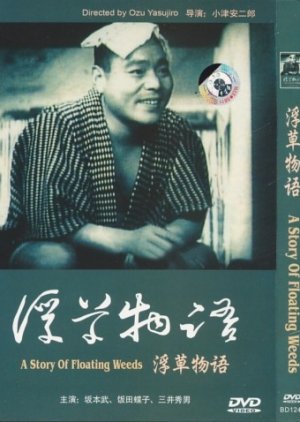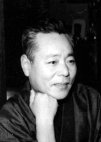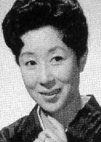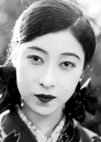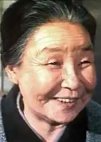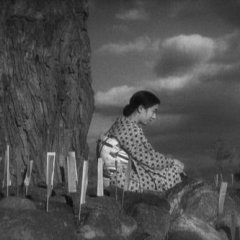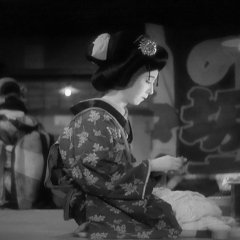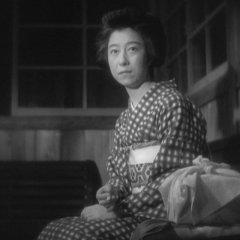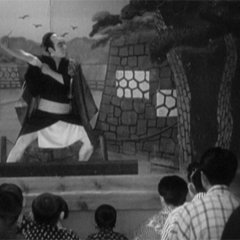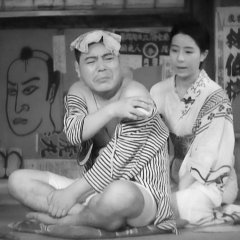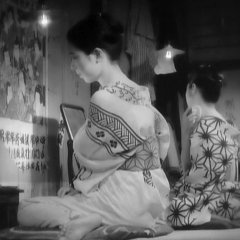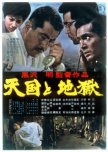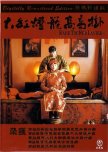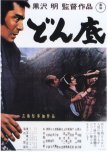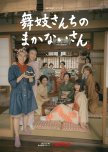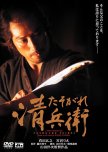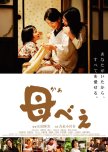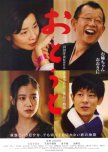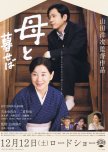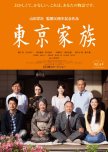- Italiano
- English
- magyar / magyar nyelv
- dansk
- Titolo Originale: 浮草物語
- Conosciuto Anche Come: Ukigusa Monogatari , Ukikusa Monogatari
- Sceneggiatore: Ikeda Tadao
- Generi: Storico, Psicologico, Vita, Drama
Cast & Ringraziamenti
- Sakamoto Takeshi Ruolo Principale
- Mitsui KojiNobuyoshiRuolo di Supporto
- Tsubouchi YoshikoOtokiRuolo di Supporto
- Aoki TomioFuboRuolo di Supporto
- Yagumo EmikoOtakaRuolo di Supporto
- Iida ChokoKaayanRuolo di Supporto
Recensioni

Questa recensione può contenere spoiler
"The world is like a lottery, you take your ups and downs"
A Story of Floating Weeds is an early silent film by Director Ozu. Many of the tenets of his later films would be found in this story of an aging actor and his abandoned and found families. The tiny troupe's resiliency would be tested in life's ups and downs.Ozu loved this story so much that he would remake it in 1959. I wrote a review for that one and I can say that the two films are strikingly similar, right down to the staging of some scenes. The 1959 version is longer and of course has more dialogue, bit characters were given more scenes, as well as the lovers. I found the 1934 version charming even though it was not as fluid and as narratively filled in as the 1959 version.
Kihachi and his troupe of floating weeds, another name for itinerant actors, return to a small mountain village to perform their Kabuki plays. The rainy season pours not only outside but also inside the little theater bringing their performances to an end.
During their rain breaks, Kihachi visits an old lover and his beloved "nephew", actually his son, and enjoys time playing games with him and fishing with him. Shinkichi has graduated from an agricultural college and is continuing his studies. All seems blissful until Kihachi's lover, Otaka, finds out about his secret family and cries vengeance. She hires a young actress to seduce Shinkichi to get even with Kihachi over his deception. This plan blows up in her face when the two young people fall in love and Kihachi finds out and breaks up with her. Meanwhile, the struggling troupe runs out of money and has to sell everything and disband. When it's revealed to Shinkichi that his uncle is actually his father, the young man understandably refuses him. This is the man who had abandoned him and his mother. His mother, Otsune, pleads on Kihachi's behalf telling her son, he didn't want him to be raised as the son of an actor. Kihachi is left adrift, unsure of what to do next.
Some of the scenes Ozu would use in the remake were here, significantly, the powerful argument between Kihachi and Otaka on opposite sides of the street in the pouring rain. It wasn't as visually impactful, but certainly as emotional. Unlike the later remake, the film began and ended with a train ride due to the mountain setting. The final scene with Kihachi and Otaka traveling away from his son to an unknown future was poignant.
All was not melodramatic, Ozu knew when to throw some humor into the situation. Two actors in a horse suit and a little boy in a dog suit brought about a smile. Unlike his Tokyo Woman, he withheld the tragedy and overt drama, finding his footing in the banal and temperamental life of the family.
I found this film to be more rounded than his earlier work such as Dragnet Girl, Tokyo Chorus, and I Was Born…But. The story felt more thorough and the characters more fleshed out. The detailed composite scenes with pauses for reflection also felt more polished. In a couple of years he would delve deeper into family life, this time with an abandoned mother, with The Only Son. Though sound had been around for a few years, Ozu delayed using it until he felt it had been perfected. With the placards I was able to follow the action easily. I watched a restored Criterion version and it was cleaned up nicely compared to so many of these old films which have been left faded and badly pocked marked. They'd also added a simple music score which fit quite well without sounding too out of place. As always, I look for his teapot scene and even in 1934, it had its closeup!
Despite bitter and surprising revelations, true to Ozu, for the most part there were no histrionics. His characters, as always, were restrained. The only exception was when Kihachi struck the two women who betrayed him as well as his son. The physical violence was quite jarring in this emotionally guarded film. Sadly, Ozu kept the beatings in the remake.
Even in the silence of the black and white film, the beautiful settings shown through. The strength of Ozu's films are the people who nearly always feel authentic making you care about their problems. Kihachi and Shinkichi fishing in quiet unison in a river seemed like a father and son anywhere in the world. Shinkichi and his actress lover made his father worry that he wouldn't be able to be a great man, but Kihachi still forgave the young woman and laid his child's future on her slim shoulders. Kihachi and Otaka weren't always easy people to like but Ozu showed so many sides of them that you still found yourself hoping they would succeed and end up in a better place as better people. Ozu doesn't lay the answers out easily, rather leaves the fate of his characters only hinted at in his enigmatic way.
2/9/23
Questa recensione ti è stata utile?

At age 31, Ozu's narrative mastery was already apparent
A Story of Floating Weeds (1934) is a silent black and white film later remade as Floating Weeds in 1959 in audio and color. I first watched Ozu's remake of "A story of Floating Weeds", then viewed the earlier version with a comparative mindset. At the time of the remake, Ozu was age 56. Floating weeds is absolutely masterful, and not surprising given the director-writer's experience and access to wider range of tools (audio, color, etc.). The precursor film, A story of Floating Weeds, is very similar to the remake. Many scenes are virtual copies. The characters, although with different names, are essentially the same.For the average movie goer, especially those without much study or knowledge on Japan, Floating weeds is by far the more accessible and recommended film. A story of floating weeds is a great watch for those that really wish to view Ozu's oeuvre and study the filmmaker or some aspect of Japanese cinema or Japanese history/society.
In viewing both films, one can sense a difference in the technological tools, the state of filmmaking, and cultural/societal influences. It's interesting, for example, to compare the few scenes of domestic violence. In the 1934 version, the hitting looks 'heavier' but there is no sound. In the 1959 version, the hitting looks 'lighter' but the sound cues make it seem more aggressive. Both viewings are disturbing, nonetheless, but it is interesting to see these scenes present with a similar outcome using different techniques; that consistency of impact demonstrates Ozu's directorial and narrative skill. He obviously knew what outcome he sought in both his 31-yr old and 56-yr old selves and could achieve it with different sets of tools.
It's remarkable that, at age 31, Ozu had a very strong grasp of techniques to achieve narrative vision. That at age 56 he felt the prior 1934 film story, itself, was well-tuned and not needing major changes is truly incredible. It seems one cannot escape the director's urge to display ego in this day and age. We have so many filmmakers who modify original story materials they work with at will, often without any logical or aesthetic advantage, simply because they can, or because they feel impotent; they want others to feel their creative stamp even more than making great film. Peter Jackson and the Lord of the Rings is a great example of that phenomenon, changing Tolkien's sources severely and utterly changing the nature of characters, plot lines, and often not for the better. If one changes something, they should improve it; if they don't improve they either have a poor ego issue or are simply not good at assessing the quality of their craft. Again, it shows great maturity and confidence that Ozu understood what made a quality narrative and there was no need to try to one-up the prequel or even himself in the remake. Great pasta is simple; do we need to inject it with novel flavors custom mixed by a pasta bartender? Are we afraid our customers will get tired of the great pasta we made to begin with?
Compared to the 1959 version, the characters of Otoki and Otaka in this film were stunning when presented side by side. I couldn't help but think they were mother and daughter. They were visually hypnotic together.
The music accompaniment - or rather the 90 minute Piano sonata - was okay. I don't know enough about accompaniments to silent films to judge confidently, but I would be intrigued to hear something else, especially something more 'Japanese'.
The 1934 version, in a comparative side by side viewing to the 1959 version, feels less full and perhaps more rushed. It works with 30 less minutes of film time. Although the plot came through just fine in the 1934 film , the 1959 version allows viewers to savor the characters and emotions more satisfactorily. Nevertheless, the Story of Floating Weeds was impactful and certainly worth a watch for the more eager Ozu viewers.
Questa recensione ti è stata utile?

